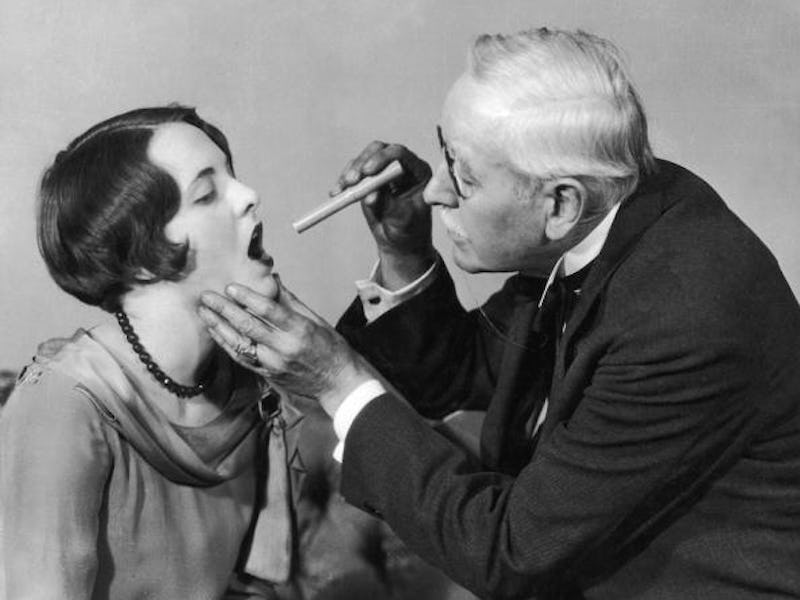How Patients Can Improve Their Bedside Manner
Help your doctor help you help yourself.

Momentum has been building towards an overall demand for doctors to improve their bedside manner, so much so that the Department of Health and Human Services recently decided patient satisfaction survey scores could determine a portion of hospitals’ Medicare reimbursements. This falls in line with an ancient way of thinking: It’s up to the doctor to make the patient happy. In the Hippocratic Corpus, a collection of ancient Greek medical texts, an author writes, “He [the physician] should endure peacefully the insults of the patients since those suffering from melancholic or frenetic ailments are likely to hurl evil words at physicians.”
Dr. Barry Silverman, a doctor at Piedmont Hospital in Atlanta, Georgia echoes this sentiment in his paper “Physician Behavior and Beside Manners.” “Patients bring fear, anxiety, and self-pity into the exam room,” writes Silverman. “It has always been the doctor’s responsibility to calm their fear.” The idea is that being sick is the worse — why shouldn’t the doctor be entirely responsible for how things go during a checkup?
To this, a counterpoint: Patients make up half of the relationship. Respectful and attentive care is obviously needed, but for patients to really get what they need out of their hospital experience, they need to bear some of the weight. Knowing, then, the hard data about doctors’ worst habits, and looking for the best patient outcome (because, well, that’s you), what can you do to put your doctor in the best position to succeed in your care?
Patient Ben Barr hugs his doctor DeeAnn Rivera.
Patients have more power to help their doctor provide the best medical outcomes than they might realize. A good place to start is actually following the doctor’s orders: There is a huge disparity between the people who go to the doctor and actually follow the advice they are given. Patients managing their treatments and actually following directions in taking medication properly, while it sounds simple enough, would be a game-changer for the healthcare industry.
A CDC study found that 44.5 percent of Americans recommended to take cholesterol-lowering drugs were not taking any medication, and only 46.6 percent of patients advised to make lifestyle changes such as working out or quitting smoking actually did so. A different study found that 43 percent of chronic pain sufferers believed that the guidelines on their medications were just “guidelines” and knowingly took more than the recommended dose. Not taking your medication or overindulging on it leads to the same result: More trips to the hospital and more interaction with doctors who increasingly feel their advice won’t be followed.
Another way some patients muck up the hospital experience is by going too often. Maggie Mahar, a fellow at the Century Foundation, told Zocalo Public Square that unnecessary hospitalizations are a major problem. “While some people in this country receive too little healthcare (the uninsured and underinsured) the well-insured (including Medicare patients) often are over-treated and over-medicated,” said Mahar. “As a result, they are exposed to needless risks.”
Slate reports that daily in America, 177,000 people who have absolutely no symptoms visit a doctor. The healthy people who visit hospitals risk exposing themselves to medication mixups, medical errors, and communicable contagions. Going to the hospital when you’re well can affect your doctor’s judgment as well — a study found that up to 42 percent of Medicare patients have received “useless tests and treatments.”
A studio portrait of a doctor and patient taken in the late 19th century.
Perhaps the best way to help your doctor, according to Maureen Bisognano, an instructor at Harvard Medical School, is to “be a source of facts.” This means both literally and holistically. Bring the necessary information to your appointments — your personal and familial history; your current and past medications. Take notes on what your doctor tells you so you can come back with the right questions.
But this also means you need to be straight with your doctor on how you’re feeling. Dr. Robert Lamberts, a physician based in Georgia, told the New York Times that the lack of honesty shown by many of his patients is mystifying. Some medical truths are embarrassing, to be sure, but there is no way your doctor can help you if you’re not giving her the full story.
It’s also time for patients to take some responsibility and realize that hospitals aren’t four-star hotels, nor should they act as such. Americans are actually endangering their health by demanding treatment outside of the means of their hospital.
In The Atlantic, Alexandra Robbins writes that the monetary reimbursements offered by the Department of Health and Human Services and the Centers for Medicare and Medicaid Service to encourage hospitals to step up customer care are inadvertently endangering patients. Patient-satisfaction surveys are important, sure, but basing such a chunk of funding on these surveys “steers focus away from patient health.” Robbins writes:
“In fact, a national study revealed that patients who reported being most satisfied with their doctors actually had higher healthcare and prescription costs and were more likely to be hospitalized than patients who were not as satisfied. Worse, the most satisfied patients were significantly more likely to die in the next four years.”
An over-indulgence in valuing patient satisfaction influences doctors to be less likely to talk their patients into treatments or lifestyle habits that they don’t want. A patient whose doctor still lets them smoke a few when they have cancer is going to be more satisfied, but they’re also more likely to die.